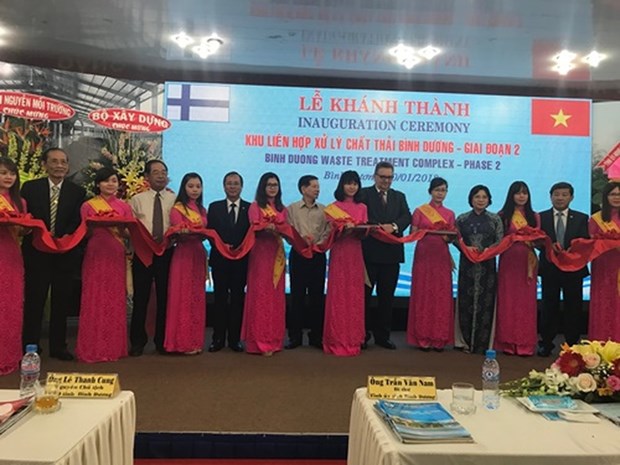Binh Duong complex provides new waste treatment model
The Binh Duong waste treatment complex in the southern province of Binh Duong can serve as a model for other localities in handling household and industrial waste, environment experts said.
 At the inaugural ceremony of Binh Duong waste treatment complex, second phase (Source: baomoi.vn)
At the inaugural ceremony of Binh Duong waste treatment complex, second phase (Source: baomoi.vn)Binh Duong (VNA) – The Binh Duong waste treatment complex in the southern province of Binh Duong can serve as a model for other localities in handling household and industrial waste, environment experts said.
The Binh Duong waste treatment complex includes a waste compost plant and an incinerator of hazardous waste with daily capacities of 840 tonnes and 320 tonnes respectively, along with a plant capable of treating 50 cubic meters of industrial waste per day.
In particular, the complex uses Finnish technology to use biogas discharged from the dumping site to produce electricity. It is able to produce 2,000 kW of electricity per day, meeting nearly half of the electricity need of the complex.
In addition, the complex also produces bricks from ash and mud discharged from waste treatment.
Construction of the 30.5 million USD complex invested by the Binh Duong Water – Environment JSC (Biwase) started in January 2004.
The second stage of the project was put into use on January 10, 2018 after 18 months of construction, four months ahead of schedule.
The 100-hectare facility is now capable of handling 1,200 tonnes of household waste, 400 tonnes of industrial waste, 200 tonnes of hazardous industrial waste and 3 tonnes of medical waste.
Once fully completed, it is expected to handle around 3,000 tonnes of household waste and more than 1,000 tonnes of industrial waste.
At present, up to 62.4 percent of waste in south eastern and Mekong Delta provinces is buried. The ratio of treated waste is 28.9 percent nationwide and 37.6 percent in the south eastern region.
Most waste treatment facilities occupy a large area of land, thus having substantial impacts on the surrounding environment.
The operation of the complex not only contributes to reducing environmental pollution in Binh Duong – an industrial hub in the southern key economic region but also provides a model of effective waste treatment technology, according to Chairman of Directors' Board of Biwase Nguyen Van Thien.-VNA













